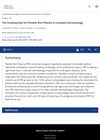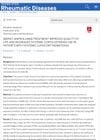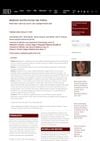 104 citations,
October 1999 in “The Journal of Urology”
104 citations,
October 1999 in “The Journal of Urology” Finasteride doesn't harm male fertility or sperm quality, but may slightly reduce ejaculate volume.
 60 citations,
June 2019 in “Ageing Research Reviews”
60 citations,
June 2019 in “Ageing Research Reviews” Fat from the body can help improve hair growth and scars when used in skin treatments.
 May 2024 in “Journal of cosmetic dermatology”
May 2024 in “Journal of cosmetic dermatology” "Dutasteride 0.5 mg daily is the most effective treatment for male hair loss."
7 citations,
October 2020 in “International Journal of Cosmetic Science” Different sizes of keratin peptides can strengthen hair, with smaller ones possibly increasing volume and larger ones repairing damage.
 September 1998 in “Journal of The European Academy of Dermatology and Venereology”
September 1998 in “Journal of The European Academy of Dermatology and Venereology” Phototrichogram helps assess hair loss severity.
 12 citations,
December 2020 in “Journal of The American Academy of Dermatology”
12 citations,
December 2020 in “Journal of The American Academy of Dermatology” The COVID-19 pandemic increased symptoms in people with skin picking and hair pulling disorders.
 September 2023 in “Journal of movement disorders”
September 2023 in “Journal of movement disorders” Dopaminergic therapy in Parkinson's disease patients is linked to increased hair loss.
 February 2022 in “Cosmetic Dermatology”
February 2022 in “Cosmetic Dermatology” Platelet Rich Plasma (PRP) is increasingly used in cosmetic dermatology for hair loss, facial rejuvenation, and after cosmetic procedures, and can be stored for up to 90 days for daily home use.
34 citations,
July 2020 in “Dermatologic Therapy” Searches for acne, hair loss, and eczema increased during COVID-19, while searches for other skin issues decreased.
 65 citations,
April 2020 in “International Journal of Molecular Sciences”
65 citations,
April 2020 in “International Journal of Molecular Sciences” PRP injections may be a safe, effective alternative for hair loss treatment compared to minoxidil and finasteride.
 38 citations,
August 2012 in “Biochemical and biophysical research communications”
38 citations,
August 2012 in “Biochemical and biophysical research communications” Human leukocytes and beard hair follicle cells have internal daily clocks, and PER1 and PER3 genes may indicate individual circadian rhythms.
 1 citations,
January 2021 in “Journal of the Dermatology Nurses’ Association”
1 citations,
January 2021 in “Journal of the Dermatology Nurses’ Association” The convention discussed various skin conditions and treatments, and highlighted the importance of vaccinations for patients on immune-altering medications.
 December 2023 in “Data in Brief”
December 2023 in “Data in Brief” Curly hair's strength and flexibility vary with moisture and temperature.
 December 2023 in “Clinical, cosmetic and investigational dermatology”
December 2023 in “Clinical, cosmetic and investigational dermatology” The new method combining dermoscopy and Reflectance Confocal Microscopy is more effective for evaluating vitiligo.
 January 2018 in “The Egyptian Family Medicine Journal”
January 2018 in “The Egyptian Family Medicine Journal” Iron deficiency anemia is significantly linked to hair loss in childbearing women, and taking iron improves the condition.

North American ginseng extract helped regrow hair in balding mice.
 30 citations,
September 2020 in “Journal of Patient-Reported Outcomes”
30 citations,
September 2020 in “Journal of Patient-Reported Outcomes” Alopecia Areata (AA) causes significant emotional distress, including feelings of embarrassment, depression, and anxiety, and impacts social interactions and daily activities.
 5 citations,
July 2020 in “Curēus”
5 citations,
July 2020 in “Curēus” Beard hair loss can signal early diabetes and thyroid issues, treatable with specific cream.
156 citations,
August 2014 in “Cochrane library” Budesonide is not effective for maintaining remission in Crohn's disease beyond three months.
 1 citations,
November 2022 in “World Family Medicine Journal /Middle East Journal of Family Medicine”
1 citations,
November 2022 in “World Family Medicine Journal /Middle East Journal of Family Medicine” People in Jeddah know about Vitamin D and its sources but are unclear on how much they need daily, and while many women take supplements, attitudes towards increasing Vitamin D levels vary.
 136 citations,
February 2017 in “International Journal of Molecular Sciences”
136 citations,
February 2017 in “International Journal of Molecular Sciences” PRP treatment improves hair growth, and the device used can affect results, with some being more effective.
1 citations,
December 2019 in “Clinical ophthalmology” Bimatoprost eye drops make rabbit eyelashes longer, thicker, and darker, and increase the number of lashes without causing inflammation.

Anifrolumab improves quality of life and reduces steroid use in lupus patients.
9 citations,
July 2019 in “Journal of cosmetic dermatology” Topical PRP cream may improve facial skin by boosting collagen.
 February 2023 in “Journal of Drugs in Dermatology”
February 2023 in “Journal of Drugs in Dermatology” Melatonin may help improve hair growth in people with certain types of hair loss.
 January 2024 in “JEADV Clinical Practice”
January 2024 in “JEADV Clinical Practice” Patients with certain skin diseases are willing to spend significant time on treatment, indicating a high impact on their lives and a need for better treatments.
January 2019 in “Frontiers in neurology” A nutrition program significantly improved a woman's lupus symptoms.
 1 citations,
January 2016 in “PubMed”
1 citations,
January 2016 in “PubMed” Keratogrow®, a spray made from patients' own blood, was found to increase hair growth and density when used twice daily for three months.
 7 citations,
January 2017 in “Clinical and medical investigations”
7 citations,
January 2017 in “Clinical and medical investigations” Suriname uses many plants for beauty, with potential for a beauty industry, but more evidence is needed for product effectiveness.
January 2022 in “Journal of Cosmetics, Dermatological Sciences and Applications” The serum increased hair density and was well-tolerated, but didn't affect hair thickness or shedding.























